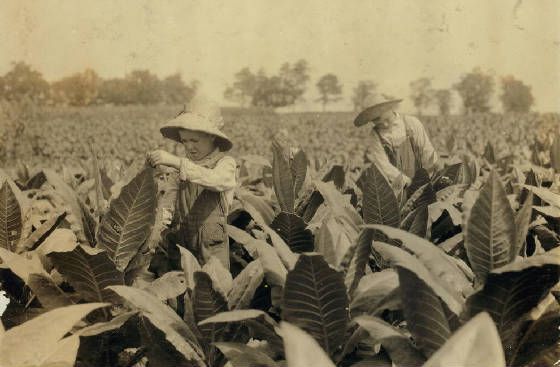
Lewis Hine caption: Worming and topping tobacco. W.L. Fugate rents farm. Willie, 12 years old and Ora, 10 years old will go to Schoolsville School, Clark Co., Ky., but it has not opened yet. Location: Hedges Station, Kentucky, August 7, 1916.
“I know he got through the eighth grade, but I’m not sure how much further he got. I know he didn’t graduate from high school. But his life turned out fairly well for what he started with. He had a nice family, and he was happy.” -Judy Johnson, daughter of Orie Fugate
“The pictures of some of the children look so sad, but as I was growing up I remember the great sense of humor my aunts and uncles had, always laughing. My dad told me that each Christmas each child got only one present, but they ate like kings. They worked hard and were taught to be responsible. It was a different time.” -Sue Fugate Peacock, daughter of William Fugate
“While my father’s life as a child might not have been easy, he did have a large and loving family and was a part of our American history.” -Alice Fugate Moore, daughter of William Fugate
The following is excerpted from Child Welfare in Kentucky, An Inquiry by The National Child Labor Committee for the Kentucky Child Labor Association and the State Board of Health, 1919
“Until the child laborer on the farm has been taken into consideration the task of securing protection and education to all the children will remain unfinished. The child labor law of Kentucky exempts in the first instance children employed in agriculture and domestic service, so this study does not include occupations, but the report of an investigation made by the National Child Labor Committee in 1916 and published in March, 1917, under the title of Farmwork and Schools in Kentucky, may be quoted from here:”
“The latest federal Census of Occupations, taken April, 1910, credits Kentucky with 64,692 child workers, 10 to 15 years of age, of whom 82 per cent, are reported as agricultural laborers, most of them on the home farm. The proportion of farm workers to the total number of child laborers is larger in the state than in the nation, those in agricultural pursuits in the entire country being slightly less than 72 per cent, of all those engaged in gainful occupations.”
“Although constituting the great majority of child laborers, these boys and girls on farms have never been considered as connected with the child labor problem. The popular conception of child labor is limited to employment for wages in factories, mines and stores, and the farm has long been looked upon as the ideal place for a child. This conviction has been strengthened by the revelations of bad conditions surrounding the city child, whether a worker in a factory, a trader in the streets, or a dweller in the tenements. Whether or not the child on the farm is relatively so fortunate as he is pictured is a question that is beginning to be asked. A few comparisons of the health and physical development of city and country children have been made, and indicate that the former are stronger and less subject to disease than the latter, but no comprehensive findings are yet available.”
“The only restrictions in the statutes of Kentucky that apply to child workers on farms concern their attendance at school, and these are somewhat contradictory. One provides that children between seven and 12 years of age inclusive, living in rural districts, except those not in proper physical or mental condition, shall attend school regularly throughout the common school term, unless taught at home; the other forbids anyone to employ a child under 14 years of age at any kind of work, at any time while the public schools where he resides are in session. There is a hiatus of one year between the maximum age of the compulsory education law and the minimum age of the child labor law — the 13-year-old child in the country not being required to attend school and yet not permitted to work at any occupation while the schools are in session. However, these laws are very generally disregarded in the rural communities, so this discrepancy is apparent only on the statute books.”
“Kentucky leads the states in the production of tobacco, which forms more than a quarter of its agricultural products. Farmers begin preparation for its culture in the winter, and the crop is marketed generally in the following autumn. The number of acres a farmer can cultivate varies somewhat according to conditions, the average being about three acres, and in determining the number even a child nine years of age is considered a ‘hand.’ Although so young a child is not strong enough to perform as much work as a grown person in all the processes of tobacco culture, in removing worms and suckers from the plants, he is just as active and efficient. Children commonly work as many hours as do the older persons-from sunrise to sunset-planting, hoeing, cultivating, worming, suckering, topping, cutting, spiking, housing and stripping. Indeed, the only task in tobacco culture which children do not perform is firing, which is done in the barn where the crop is housed, and requires the care and judgment of an adult. The other farm work in which children help in the school term, and which thereby prevents their regular attendance at classes, includes plowing, cultivating and cutting corn, filling silos, threshing grain, picking berries, making hay, and drying apples.”
“The school term in the rural districts is usually seven months and schools often begin early in July so that they may be closed before the winter weather makes the roads impassable for the children. This period coincides with the busy season on the farms, particularly in tobacco culture, and in this conflict between work and school attendance the odds are at present in favor of the work. The report cites many instances of children no older than eight and nine years, together with children of all ages, who work side by side with the adults on the farm and whose attendance at school is cut down to less than one-third in some cases and in others to such an extent as to be negligible.”
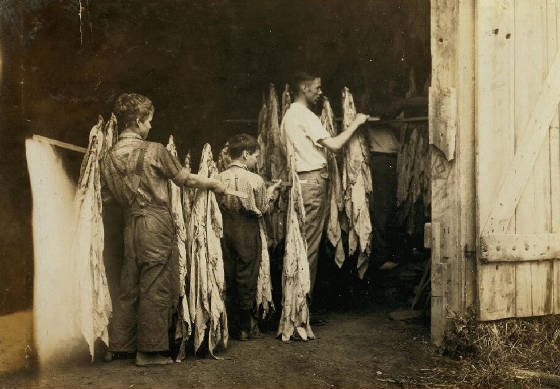
Lewis Hine caption: Housing tobacco in barn of W.L. Fugate. Will go to Schoolsville School but it has not opened on account of repairs. Lewis W. Hine. Location: Hedges Station, Kentucky, September 15, 1916.
From the time I was eight years old (January 1950), until I grew up and moved away, I lived in rural Calvert County, in Southern Maryland. My father was a marine biologist. The population of the county then was about 15,000, and a large number of families either lived or worked on tobacco farms. I remember that there were many students who were absent for periods of time in the early fall, during the harvest. Those absences were routinely excused. Although this happened a good 40 years after the Fugates were photographed in Kentucky, the circumstances were not much different. Traditions change slowly in rural America.
According to Hine’s notes, he photographed the Fugates twice; on August 7, 1916, and September 15, 1916, almost six weeks later. He may have returned to see if the children were in school by then. They weren’t, according to Hine’s caption: “Will go to Schoolsville School but it has not opened on account of repairs.”
There are slightly over 1,000 persons with the surname of Fugate listed in the 1910 Kentucky census, but I had no trouble finding this family. According to the information on Kentucky GenWeb, Hedges Station, where the Fugates lived, “is a station and village on the C&O Railroad in Clark County, between Dodge and Thomson Station and was named for Preston Hedges, the owner of the land where the station and village are situated.” It is about six miles east of Winchester.
I quickly found William Fugate’s death record and obituary, and that led me to his daughter, Sue Peacock, and to Judy Johnson, Orie Fugate’s daughter. Their interviews, and some family photos are on the following pages.
Orie W. Fugate was born June 11, 1906, and William Loran Fugate Jr. on April 10, 1904. They were among 12 children born to William Loran Fugate Sr. and Laura Woodward Fugate, who were married about 1886. Both were born in Virginia. William Sr. died in Winchester, Kentucky, on October 26, 1939. Laura died in Winchester, on May 29, 1946.
Orie passed away in Hamilton County, Ohio, on July 7, 1959, at the age of 53. He was killed in a construction accident. His brother William died in Florida on August 5, 1977, at the age of 73.
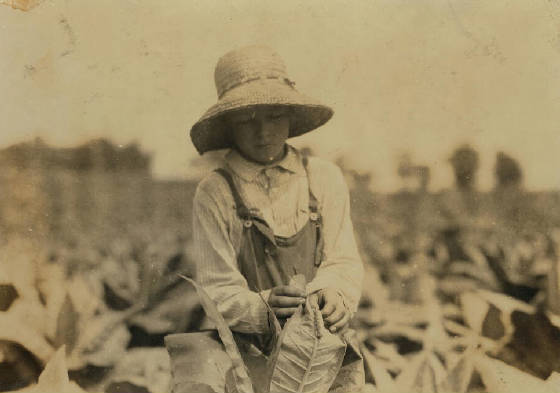
Lewis Hine caption: Ora Fugate, 10 years old worming tobacco. They said they do not worm in middle of day when hot, but work right through when “suckering.” Location: Hedges Station, Kentucky / Lewis W. Hine, August 7, 1916.
Edited interview with Judy Johnson (JJ), daughter of Orie Fugate. Conducted by Joe Manning (JM), on February 6, 2008. Transcribed by Jessica Sleevi and edited by Manning.
JM: Were you surprised to see the photo?
JJ: Yes, but I have a copy of one of the others, the one with the three boys in the barn hanging tobacco. It’s been passed down in my family. My dad had it, I guess, and then my mother gave it to me. I just assumed that it was a photograph someone they knew took, which I was surprised about, because I didn’t see any other photographs of him from that time period. I didn’t really think that much about it until I saw the photo you sent me.
JM: Did your father work in the tobacco fields for a long time?
JJ: Yes, in the Winchester and Mt. Sterling area. He came to Cincinnati when he was about 16 or 17. Then he ended up marrying and settling down here in Cincinnati. He eventually became a contractor and did carpentry work. He did some for himself for awhile and then worked for another gentleman. That’s the only occupation that I can remember him having.
JM: Who did he marry?
JJ: He married Gladys Makeever in 1930. She was from Cincinnati.
JM: When were you born?
JJ: 1941.
JM: How many children did your parents have?
JJ: Just me and my brother. My brother was born in 1931.
JM: When did your father pass away?
JJ: In 1959. He was killed in a construction accident.
JM: Is your mother still alive?
JJ: She passed away last year.
JM: Did your mother ever work in her life?
JJ: She did a little bit of secretarial work. Once she got married, she didn’t work.
JM: Did you go to college?
JJ: I took a few classes, but didn’t graduate. I was a secretary before I had kids, and then I quit once the kids started coming. And then I went back to work when they got to be teenagers, started as a secretary and ended up doing human resources and payroll work.
JM: Did your father ever tell you much about working on the tobacco farm when he was a kid?
JJ: No. When I was a kid, I didn’t really think much about that. And now I wish he would have talked more about it. We used to go down there to visit, because I still have aunts and uncles down in that area. We’d go down to visit quite often, but he really never said too much about the work.
JM: Did he ever talk at all about the conditions in his life at that time? You can’t tell from the picture whether he was really poor or just working on the farm.
JJ: I don’t know. They didn’t have a lot of money, and there were 12 kids in the family, but I don’t know that they were extremely poor. He never talked about being really poor.
JM: Did you know his parents?
JJ: I vaguely remember his mother. She died when I was small. His father had already passed away when I was born. My father was the second youngest of the 12.
JM: When you went down there to visit, did they still have the tobacco farm?
JJ: My Aunt Pearl and my Aunt Ollie had tobacco farms, but neither of them was the original farm that my parents and grandparents were on. I don’t know if my grandparents actually owned a farm or if they just rented it. (The caption says they rented it, and in the 1920 census, they are listed as renters.)
JM: What was your father like?
JJ: He was a very nice guy. He was very caring, gentle, a good father. He was not real outgoing, but not shy either. He liked to do a lot of handiwork. I remember that he made a doll house for me and my cousins. He enjoyed doing things like that when he had the time, but he worked an awful lot.
JM: What do think about the fact that a number of photos of your family were taken by Mr. Hine, and that they were shown as examples of child labor?
JJ: I was kind of surprised, because I know in those days, families did it. It wasn’t like they farmed him out to work for somebody else. They had big families, and the kids had to help on the farm.
JM: What did your father like to do for recreation?
JJ: My parents got into square dancing a lot. And they liked to play cards with friends.
JM: Where did you live when you were growing up?
JJ: Golf Manor. It was about 10 miles from downtown Cincinnati. At the time, it was a suburb which was out fairly far. The city limits were at the end of the street we lived on.
JM: What kind of house was it?
JJ: It was just a little ranch house. There were two bedrooms on the first floor. And then my father finished the second floor. He put stairs up there, finished the attic, and made a room and a bathroom up there.
JM: One of the arguments that people had against child labor was that it was keeping children from going to school.
JJ: A lot of the schools there would have adjusted their schedules to accommodate the tobacco farmers.
JM: How far in school did your father get?
JJ: I know he got through the eighth grade, but I’m not sure how much further he got. I know he didn’t graduate from high school. But his life turned out fairly well for what he started with. He had a nice family, and he was happy.
Edited interview with Sue Peacock (SP), daughter of William Fugate, conducted by Joe Manning (JM), on March 5, 2008.
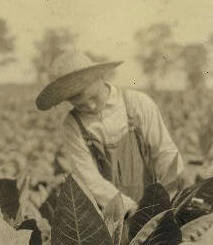
JM: What did you think of the photos?
SP: I thought they were awesome. I didn’t even know that any pictures existed of my father as a little child. I was strongly connected to my dad when he was an adult, but the photos connected me to my dad as a child, and that’s the wonderful part of it. It’s one thing to be told by him that he worked on a farm, but to see him there in these pictures is amazing.
I started to look at things differently. My niece started looking things up, and she said, “Oh, they were sharecroppers.” But they weren’t. They owned their farm, the house and the land. My dad described it as a two-story brick house with big, tall windows. They weren’t wealthy, but they weren’t poor either. They had 12 children, and everybody helped. (The caption says they rented it, and in the 1920 census, they are listed as renters.)
JM: When did your father leave Kentucky?
SP: I’m not sure, but he was already out on his own at 15 years old. For at least a couple of years, he lived with a sister and her husband on their farm. Then he moved to Cincinnati. He went to night school and finished high school. All my aunts and uncles were educated. He married Ollie Susan Watson on December 25, 1927. She was from Liberty, Kentucky. I was born in Cincinnati in 1938, and I have two sisters, Ramona and Alice. My dad had a garage and filling station, and then owned a body shop. But about 1945, we moved to Miami (Florida), and he worked in the body shop of a Chevrolet dealer. Later on, he was an apartment house manager in Coral Gables.
JM: Did your father talk much about growing up on the farm?
SP: My dad talked about the home and all the food that his mother used to make. She would cook for a week before Christmas. They had this big cabinet on the wall, and she would fill it with pies and cakes. They would have their big meal at noon, and then the leftovers for the evening. She would have a huge pan of cornbread and biscuits every day. She was 41 when my dad was born, and there were two more after him. I remember him talking about going on his first date. He had a team of horses and a buggy, and they went to church. Nowadays, that seems so ancient.
JM: What was your father like?
SP: The most important thing to him was his family. And he was a sweetheart, a gentle giant. He was six feet tall and very handsome. My mother said it was his wavy dark hair that attracted her. He was like magic with babies. There was a couple in one of the apartments that he managed. They had a baby daughter, and anytime Dad walked by, she would reach out, because she wanted Dad to hold her. One day, the doorbell rang, and it was the baby’s grandfather. He asked my dad: “What do you do? It’s like magic. She won’t even let me hold her.”
He loved to play games and cards. They got a new croquet set every year because they would wear one out quickly. They had a huge yard, and they would play croquet every evening. Dad was an expert croquet player all through his life and taught my sisters and me how to play. He had a great sense of humor. My husband told me once, “I never met anyone who enjoyed a joke as much as your dad.” He would laugh until tears were rolling down his face.
JM: Did you go back to Kentucky a lot?
SP: Yes. We used to visit my aunt in Clark County, and we would play hide and seek in the tobacco. It’s funny that some of the photos show them worming the tobacco. If I had known there were worms all over it, I probably wouldn’t have played there.
JM: Did you ever see the house that your father lived in?
SP: No. The house was apparently torn down. My dad said he wished he could have had the beautiful curved banister that went up to the second floor. He died on August 5, 1977, and he’s buried in Winchester, Kentucky, which is only a couple of miles from where he grew up.
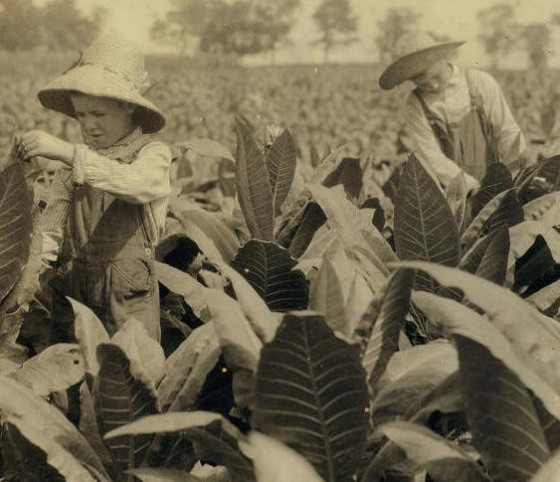
Lewis Hine caption: Worming and topping tobacco. W.L. Fugate rents farm. Willie, 12 years old and Ora, 10 years old will go to Schoolsville School, Clark Co., Ky., but it has not opened yet. Location: Hedges Station, Kentucky.
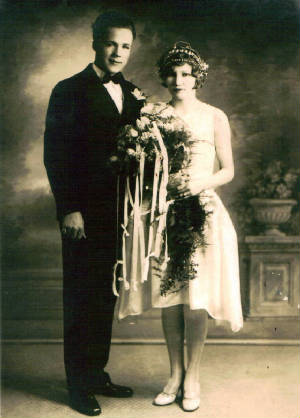
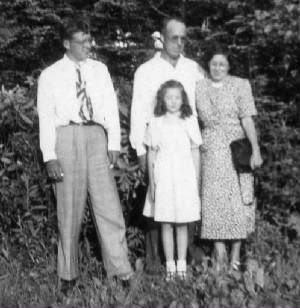
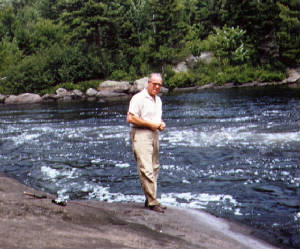
*Story published in 2009.